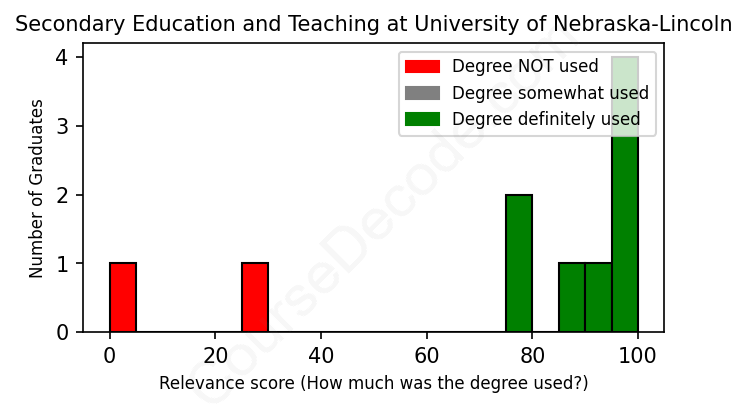
First, some facts. Of the Secondary Education and Teaching graduates from University of Nebraska-Lincoln we've analyzed , here's how many have used (or NOT used) their degree in their career:

These are estimates based on AI analysis of 10 LinkedIn profiles (see below).
The verdict? Above average. Overall, with an average relevance score of 76%, Secondary Education and Teaching graduates from University of Nebraska-Lincoln have a higher likelihood (+9%) of finding work in this field compared to the average graduate across all fields:
And for comparison, here's the chart for all profiles we've looked at across all degrees.
Also, after graduating, 40% of these graduates have pursued further education other than another Bachelor's degree (such as a Masters degree or other), compared to the average across all profiles of 35%. This suggests you may need more than just a Bachelors degree to be competitive as a Secondary Education and Teaching graduate.
See the details:
|
Relevance score: 100% We think this person has gone into a career highly relevant to their degree. We think this person has gone into a career highly relevant to their degree.
DEGREE INFOGraduated in 2010 from University of Nebraska-Lincoln with a Bachelor of Science (B.S.) in Secondary Education and Teaching. Also pursued further education since (see below). JOB HISTORY SINCE GRADUATION8th Grade English Teacher Sioux Falls School District Aug 2010 - Jul 2013 8th Grade English Teacher  Lincoln Public Schools Aug 2013 - Present FURTHER DEGREES DONE SINCE GRADUATINGMaster of Education (M.Ed.)University of Sioux Falls 2011 - 2013 ABOUTNo information provided. |
The top 10 most common jobs done by the graduates we've analyzed (ranked most common to least) are:
It looks like a lot of folks who graduated with a degree in Secondary Education and Teaching from the University of Nebraska-Lincoln have found themselves in various teaching roles, especially in subjects like English, mathematics, and business. Positions like business teacher and English teacher are spot on because they utilize exactly what they learned in their courses. A good number of graduates also worked as long-term substitute teachers or in more specialized roles like an International Baccalaureate program coordinator, which taps into their educational training, though slightly differently. Overall, many of these jobs keep them connected to the education field, helping them apply their skills directly in the classroom.
On the flip side, there are graduates who veered off into roles that don't really call for their education background, like client services analysts and data analysts at various companies. While those positions might require some analytical skills, they don’t involve teaching or educational practices at all. So, while it’s clear that many graduates are using their degrees effectively, there are also quite a few who have ended up in jobs where their teaching skills aren’t as relevant. In the end, it seems like a mix—where many are staying true to their educational roots, but some wander into other career paths that don’t fully capitalize on their training in secondary education. It’s an interesting mix, for sure!
Here is a visual representation of the most common words in job titles for Secondary Education and Teaching graduates (this is across all Secondary Education and Teaching graduates we've analyzed, not just those who went to University of Nebraska-Lincoln):

When it comes to graduates from the Secondary Education and Teaching program at the University of Nebraska-Lincoln, it seems that many of them stick pretty closely to careers in education, particularly for their first job right out of college. A lot of them land roles as teachers, which is exactly what you'd expect with their degree. For instance, graduates from 2010, 2012, and 2013 took on positions as business or English teachers right away, often remaining in those roles for several years. As you look at their career paths, it’s clear that many continue teaching or move into educational administration roles as they gain experience.
However, it’s also interesting to note that not everyone sticks strictly to a teaching career. Some graduates, like those from 2012 and 2013, have ventured into fields like client services and data analysis. This shows that while a lot of people find fulfilling careers in education, there’s a fair share who pivot into other industries after a few years. In general, the graduate trajectory seems to be quite solid for those who want to stay in education, with many remaining teachers or even stepping up into leadership positions. Meanwhile, others have gone in a different direction but still leveraged their skills in impactful ways. So, if you're considering a degree in Secondary Education and Teaching, it looks like you can find a good spot in the job market, whether it’s in the classroom or beyond!
Honestly, pursuing a Bachelor’s degree in Secondary Education and Teaching at the University of Nebraska-Lincoln can be pretty challenging, but it’s not the hardest degree out there. It involves a combination of educational theory, hands-on teaching practice, and lots of coursework related to your subject area—whether that's math, science, or English. You'll also need to complete student teaching, which can be both exciting and nerve-wracking. Overall, while it requires dedication and effort, especially with juggling lesson plans and classroom management, many students find it manageable if they stay organized and passionate about teaching. So, you can expect a good balance of workload and support along the way!
Most commonly, in the LinkedIn profiles we've looked at, it takes people 5 years to finish a Bachelor degree in Secondary Education and Teaching.
Looking at these grad profiles from the University of Nebraska-Lincoln, it seems like they’re mostly doing okay financially, but not exactly raking it in, you know? The ones who stuck with teaching in public schools generally earn a decent salary, especially if they’ve moved into admin roles or experienced increased responsibilities over the years. However, some have switched to more corporate jobs (like the one who became an analyst) which often come with higher paychecks. Others, like those working as missionaries or substitute teachers, might not be pulling in as much, especially early on. So, overall, while there are solid earning potential and career growth opportunities, not everyone seems to be cashing in big bucks right out of the gate.
Here is a visual representation of the most common words seen in the "about" section of LinkedIn profiles who have a Bachelor degree in Secondary Education and Teaching (this is across all Secondary Education and Teaching graduates we've analyzed, not just those who went to University of Nebraska-Lincoln). This may or may not be useful:

Here are all colleges offering a Bachelor degree in Secondary Education and Teaching (ordered by the average relevance score of their Secondary Education and Teaching graduates, best to worst) where we have analyzed at least 10 of their graduates:
| College | Score | Count |
|---|---|---|
 Arizona State University Arizona State University
|
81 | 10 |
 University of Nebraska-Lincoln University of Nebraska-Lincoln
|
76 | 10 |
 Penn State University Penn State University
|
70 | 16 |